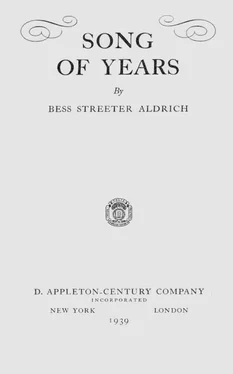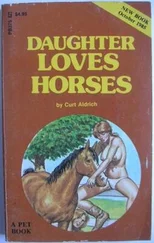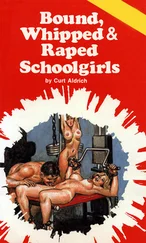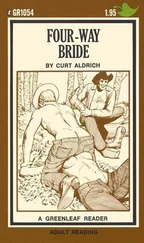“You must have been here all night.”
“Just getting ready to all take hold and heave you into the Mississippi.”
“Found a gold mine or somethin’ you’re afraid’ll get away?”
There was more rough banter and then Wayne Lockwood was in the building and the first of the line in front of the wooden railing and desk.
“Name?”
“Wayne Lockwood.”
A few other questions and then: “Number of your claim?”
“Black Hawk . . .” He named the three sets of figures.
The agent ran a none-too-clean forefinger across the map and down the column of a large book.
“All right. It’s yours.”
Wayne opened his shirt and from the quilted band around his strong young body got out his gold and paid it over—a dollar and a quarter per acre—and signed the necessary papers, placing his government deed in the quilted belt. Then he sauntered over to the high iron stove in which no fire was burning this June morning and sat down on a wooden bench behind it, concealed from the vision of any one in the line.
He did not have long to wait. Two men in fresh linen, one younger than the other, came through the door, and in the course of time worked by degrees to the agent’s desk.
“Well, well, Mr. Bedson.” For the first time the agent jumped up and shook hands with an applicant. Evidently Mr. Bedson was a personage here. “Back again. Did you find what you wanted?”
“Yes . . . several. First and best to my mind . . . Black Hawk . . .” He, too, named the three sets of figures.
The numbers must have seemed vaguely familiar to the agent for he frowned and ran a finger, a little more soiled by now, down the map and consulted also the large book for verification.
“Sorry, Mr. Bedson. That’s filed on.”
“Oh, no, it couldn’t be. There’s some mistake.”
“No, there’s no mistake. Young fellow by the name of Lockwood. Was here first thing this morning. Found him asleep in the doorway.”
From behind the stove, his cap pushed back on his light wavy hair, a smudge of dirt across his face, eyes bloodshot, his boots caked with swamp mud, stepped Wayne Lockwood, grinning. That widespread grin had in it something of the mature malevolence of Mephistopheles and something of the boyish impudence of Puck.
For this hour had he lived. For this one exalted moment had he walked, sleepless and hungry, the long way from the Valley of the Red Cedar, forded the streams, pushed through swamps, and trampled down a hundred miles of prairie grass.
It was worth it—worth all the torturing strain he had put upon his strong young body to be able to step from behind the high iron stove there in the government land-office and say to the stranger:
“Yes, it’s mine. And see that you don’t try anything foolish around there to make trouble.”
One week later found Wayne Lockwood nearing the end of his second journey to the Valley of the Red Cedar, nearly back to the quarter-section he had chosen with such swiftness of decision, and tramped a hundred weary miles to obtain. This time, however, he had his newly purchased team and wagon, a plow and a few other tools, a buffalo robe, a hidebound chest with brass bands which his grandfather had once carried to sea, and a box of bedding from his parents’ home there in the New England hills, these last two having been left in Dubuque until his entry was made.
All these days he had been on the westbound trail again, from Dubuque to Delhi, with its one-roomed log house for travelers, from Delhi to Independence and its slightly larger log tavern, from Independence to Prairie Rapids with not a single cabin ever in sight between these points.
The previous night he had stayed at Prairie Rapids and now he was on the last lap of the long journey, driving the five miles across the prairie to his land. His land! It gave him a queer feeling in which pride and a sense of responsibility were the leading emotions, but running through both, like a scarlet thread in a gray coat, was the boyish jubilation over winning out in the entry of it. All he needed to cheer him in any moment of homesickness or fear for his ultimate success in the new country was to recall that look of amazement and chagrin which had come over the face of the dapper young fellow whom he had beaten out of it. Even now as the new wagon jolted over the trail he laughed aloud at the remembrance.
Yes, it was his right, thanks to a quick decision and two good legs, and no finer land lay anywhere in the new state, he would wager. A little nearer to Sturgis Falls than to the Prairie Rapids settlement, and a mile north of the beaten trail which paralleled the river, it was ideally placed. Just which one of the two settlements he would like better, which he would honor with his patronage—he grinned at that—remained to be seen.
Because his mind was his only companion, he passed the time of his journeying with thoughts of the previous day’s happenings, pictures of it slipping through his head in changing sequence; the Prairie Rapids settlement as he had seen it the day before, a little handful of log cabins scattered over the prairie on both sides of the river, a few split-rail fences, a tent, two or three families still living by the side of their wagons.
He had fully expected to drive to his own land the evening before and sleep in the wagon, but reaching the settlement late, with threatening clouds rolling up from the west, he had decided to stay at the log tavern. Here he grinned to himself again at the memory of the evening spent at the Sherman House.
After he had made his team comfortable under the straw-thatched shed he had gone inside the tavern, had been talking to Mr. Sherman, with pen in hand ready to sign the register, when his rival for the land came in. He had relished that moment, that handing of the pen over to the dapper young fellow with a flourish in exaggerated politeness, as though the name of Mr. Bedson must necessarily precede that of Wayne Lockwood.
The chap had signed it with a cool nod of acknowledgment, and then, with his own underneath, the two names had stood there together on the book even as the two men were side by side.
Cady Bedson. Wayne Lockwood.
It was a queer episode and it made him wonder just how often they were going to run into each other out here. But it was the next move that had given him the best laugh. Mr. Sherman had said to a young boy standing near: “Show Mr. Bedson up to Room 12 and Mr. Lockwood to Room 16.”
“Room 12?” Cady Bedson had said in surprise. “Why, is that a single room?”
“Certainly,” the proprietor had answered seriously enough. And the two had gone up to the loft, not high enough in the center to allow a six-footer to stand straight, sloping to a mere three feet on the sides, an opening in each gable-end for ventilation, and eighteen bunks on the floor through which there was just room to walk, but very truly a “single room.” The boy had broken into loud guffawing and said proudly: “He cracks that joke every time.”
A calico curtain inclosed one bunk at each end which, a young blade on the pallet next to Wayne informed him with accompanying smirks, contained some brides and grooms.
Before the night was over the beds apparently were all occupied. They were hard and damp from a recent shower which had seeped in between the logs. The pillows were small and might have been stuffed with goose-quills. One fellow called down the loft stairs: “Hey, Sherman! I’m afraid to go to sleep . . . afraid a pillow will work into my ear,” which brought forth loud laughter.
All night there had been more or less commotion. A woman sobbed. A shower caused some one to find and put up an umbrella. Some of the roomers called out to keep quiet and let them sleep, others snored, oblivious to the thunder rattling around the log roof. This Bedson was not up yet when he left. Oh, well, he might never see the fellow again. There was no certainty he belonged permanently in these parts.
Читать дальше












